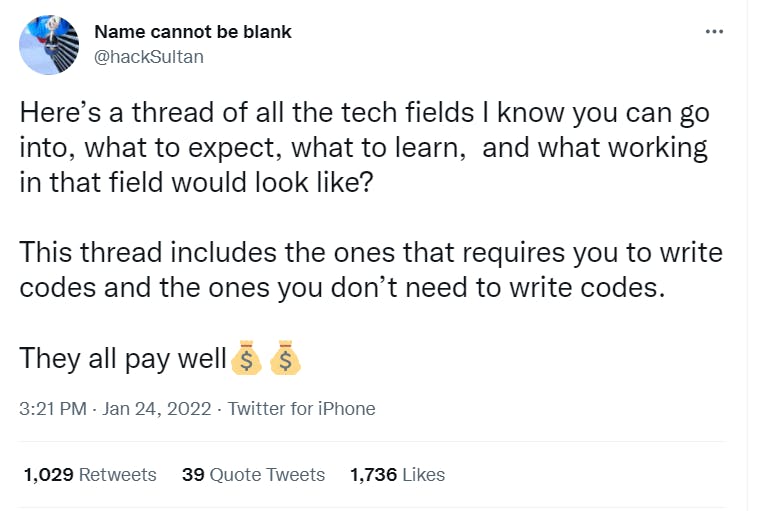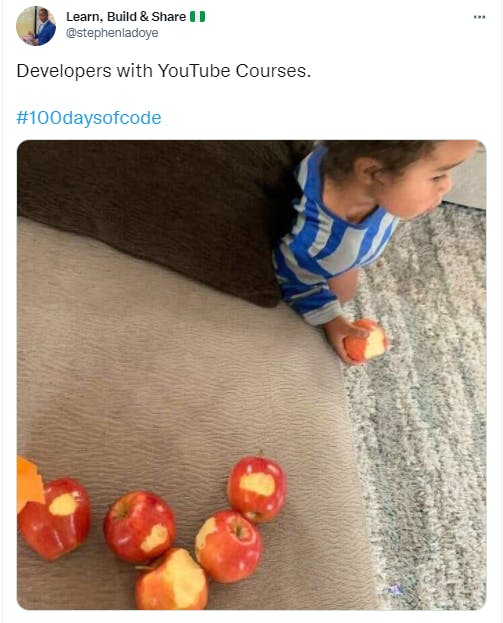So you have decided to build a career in tech. Great, I love that for you. Now what?
If you've read my previous blog posts, you already know that I started working towards a career in tech a year ago. In this post, I share some insights from my journey so far, so you don't have to make the same mistakes I did.
First things first, it is important for you to know what you want to do, why you chose to do it, and how you intend to achieve it.
WHAT
Choose your field
This might take a bit of trial and error. The beauty of tech is that there is a variety of career paths to choose from (whether code or no-code), and you’d be surprised at what you’d turn out to be great at. I used to think I would be a graphic designer, but now I center divs and curse at JavaScript. I did a bit of research and found a few resources to get you started, because information is power.
16 Tech Careers You Can Land - No Coding Required.
11 High-Paying Tech Jobs to Consider if You Have No Experience.
70 Resources for African Women in Tech
Also, check out this Twitter thread by HackSultan

WHY
Motivation. Incentive. Rationale.
While we can all agree that sapa is the greatest motivator, it doesn't hurt to have other incentives. Now you have chosen a career path, but why? Perhaps you've always had an eye for design, so you gravitated naturally towards UI/UX. Or maybe you just have a thing for AI. Know exactly why you are making this decision, then do further research to solidify your stance, because if you decide to be a marketer or a product manager because it is "easy", you my dear will be in for a shock.
HOW
Networking
I know you might be tired of being told this, but this really is the hack. Twitter is arguably your best bet at having access to a lot of relevant information in tech, from Spaces to informative threads, to even DMs. One thing about "Tech Twitter", there will always be people willing to answer your questions. From there, you can even find and join amazing supportive communities.
Have a Roadmap
This is very important, because you don't want to be stuck in "tutorial hell". If you do the networking bit right, you can easily gain access to the information you need to determine a clear learning/career path. If you are considering software development, it's very easy to be overwhelmed by the vast number of options available. You don't have to be in all the bootcamps or learn all the programming languages, that's just burnout waiting to happen. Here's a roadmap for developers, because I'm partial to devs, sorry 🥰.
Practice
You need to practice what you learn, otherwise you're going right down the rabbit hole of tutorial hell. I can't stress this enough- build stuff. Design that landing page, build that To-do app, or whatever is applicable to your situation. When you stop practicing, you start forgetting and you're back where you started in no time. (Again, because I have a soft spot for frontend devs, you can find cool practice projects at https://frontendmentor.io/).
Discipline
Having a schedule can do wonders for your productivity, and I dare say can help reduce burnout. Another trick that can help you is getting an accountability partner. Mine is really great (most days 🌝).
TL;DR
DO
- Research: explore your options.
- Plan
- Network: interact with people who will be instrumental to your growth.
- Join a community
- Gather resources
- Build projects
- Ask questions
- Be accountable
DON’T
- Be a tutorial hoarder.
- Let sapa be your sole motivator.
If you've read to this point, do let me know your thoughts. A parting word: I know you want to be a full stack developer or a world class designer in 3 months, but please, give yourself time to grow. Stop jumping from one bootcamp or tutorial to another. Don't be that person!

Thank you for coming to my Ted talk. 🙂
Disclaimer: I do not own rights to any images used in this article.
